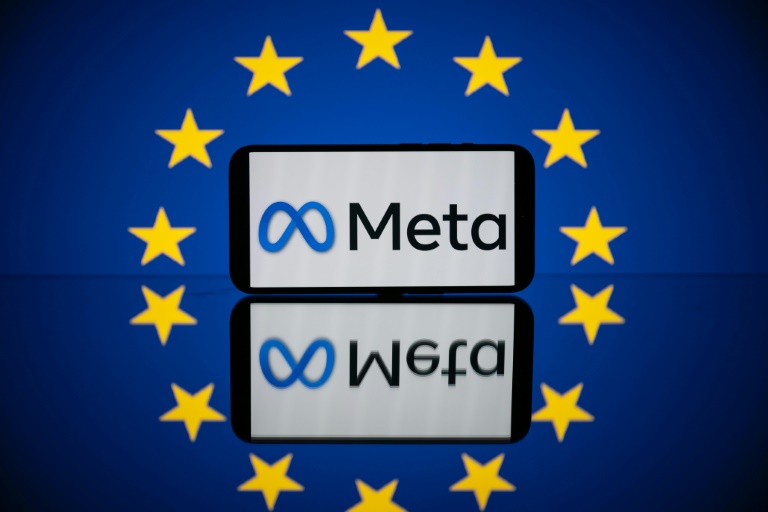SOCIAL
EU opens disinformation probes into Meta, TikTok

The EU sent formal requests for information to Meta and TikTok in what is a first procedure launched under a new law – Copyright AFP LEANDRO LOZADA
Raziye AKKOC
The EU announced probes Thursday into Facebook owner Meta and TikTok, seeking more details on the measures they have taken to stop the spread of “illegal content and disinformation” after the Hamas attack on Israel.
The European Commission said it had sent formal requests for information to Meta and TikTok respectively in what is a first procedure launched under the EU’s new law on digital content.
The EU launched a similar probe into billionaire mogul Elon Musk’s social media platform X, formerly Twitter, last week.
The commission said the request to Meta related “to the dissemination and amplification of illegal content and disinformation” around the Hamas-Israel conflict.
In a separate statement, it said it wanted to know more about TikTok’s efforts against “the spreading of terrorist and violent content and hate speech”.
The EU’s executive arm added that it wanted more information from Meta on its “mitigation measures to protect the integrity of elections”.
Meta and TikTok have until October 25 to respond, with a deadline of November 8 for less urgent aspects of the demand for information.
The commission said it also sought more details about how TikTok was complying with rules on protecting minors online.
The European Union has built a powerful armoury to challenge the power of big tech with its landmark Digital Services Act (DSA) and a sister law, the Digital Markets Act, that hits internet giants with tough new curbs on how they do business.
The EU’s fight against disinformation has intensified since Moscow’s invasion of Ukraine last year and Russian attempts to sway European public opinion.
The issue has gained further urgency after Hamas’ assault on October 7 on Israel and the aftermath which sparked a wave of violent images that flooded the platforms.
The DSA came into effect for “very large” platforms, including Meta and TikTok, that have more than 45 million monthly European users in August.
The DSA bans illegal online content under threat of fines running as high as six percent of a company’s global turnover.
The EU’s top tech enforcer, Thierry Breton, sent warning letters to tech CEOs including Meta’s Mark Zuckerberg, TikTok’s Shou Zi Chew and Sundar Pichai of YouTube owner Alphabet.
– Growing EU fears –
Breton, EU internal market commissioner, told the executives to crack down on illegal content following Hamas’ attack.
Meta said last week that it was putting special resources towards cracking down on illegal and problematic content related to the Hamas-Israel conflict.
On Wednesday, Breton expressed his fears over the impact of disinformation on the EU.
“The widespread dissemination of illegal content and disinformation… carries a clear risk of stigmatisation of certain communities, destabilisation of our democratic structures, not to mention the exposure of our children to violent content,” he said.
AFP fact-checkers have found several posts on Facebook, TikTok and X promoting a fake White House document purporting to allocate $8 billion in military assistance to Israel.
And several platforms have had users passing off material from other conflicts, or even from video games, as footage from Israel or Gaza.
Since the EU’s tougher action on digital behemoths, some companies, including Meta, are exploring whether to offer a paid-for version of their services in the European Union.
SOCIAL
Snapchat Explores New Messaging Retention Feature: A Game-Changer or Risky Move?

In a recent announcement, Snapchat revealed a groundbreaking update that challenges its traditional design ethos. The platform is experimenting with an option that allows users to defy the 24-hour auto-delete rule, a feature synonymous with Snapchat’s ephemeral messaging model.
The proposed change aims to introduce a “Never delete” option in messaging retention settings, aligning Snapchat more closely with conventional messaging apps. While this move may blur Snapchat’s distinctive selling point, Snap appears convinced of its necessity.
According to Snap, the decision stems from user feedback and a commitment to innovation based on user needs. The company aims to provide greater flexibility and control over conversations, catering to the preferences of its community.
Currently undergoing trials in select markets, the new feature empowers users to adjust retention settings on a conversation-by-conversation basis. Flexibility remains paramount, with participants able to modify settings within chats and receive in-chat notifications to ensure transparency.
Snapchat underscores that the default auto-delete feature will persist, reinforcing its design philosophy centered on ephemerality. However, with the app gaining traction as a primary messaging platform, the option offers users a means to preserve longer chat histories.
The update marks a pivotal moment for Snapchat, renowned for its disappearing message premise, especially popular among younger demographics. Retaining this focus has been pivotal to Snapchat’s identity, but the shift suggests a broader strategy aimed at diversifying its user base.
This strategy may appeal particularly to older demographics, potentially extending Snapchat’s relevance as users age. By emulating features of conventional messaging platforms, Snapchat seeks to enhance its appeal and broaden its reach.
Yet, the introduction of message retention poses questions about Snapchat’s uniqueness. While addressing user demands, the risk of diluting Snapchat’s distinctiveness looms large.
As Snapchat ventures into uncharted territory, the outcome of this experiment remains uncertain. Will message retention propel Snapchat to new heights, or will it compromise the platform’s uniqueness?
Only time will tell.
SOCIAL
Catering to specific audience boosts your business, says accountant turned coach

While it is tempting to try to appeal to a broad audience, the founder of alcohol-free coaching service Just the Tonic, Sandra Parker, believes the best thing you can do for your business is focus on your niche. Here’s how she did just that.
When running a business, reaching out to as many clients as possible can be tempting. But it also risks making your marketing “too generic,” warns Sandra Parker, the founder of Just The Tonic Coaching.
“From the very start of my business, I knew exactly who I could help and who I couldn’t,” Parker told My Biggest Lessons.
Parker struggled with alcohol dependence as a young professional. Today, her business targets high-achieving individuals who face challenges similar to those she had early in her career.
“I understand their frustrations, I understand their fears, and I understand their coping mechanisms and the stories they’re telling themselves,” Parker said. “Because of that, I’m able to market very effectively, to speak in a language that they understand, and am able to reach them.”Â
“I believe that it’s really important that you know exactly who your customer or your client is, and you target them, and you resist the temptation to make your marketing too generic to try and reach everyone,” she explained.
“If you speak specifically to your target clients, you will reach them, and I believe that’s the way that you’re going to be more successful.
Watch the video for more of Sandra Parker’s biggest lessons.
SOCIAL
Instagram Tests Live-Stream Games to Enhance Engagement

Instagram’s testing out some new options to help spice up your live-streams in the app, with some live broadcasters now able to select a game that they can play with viewers in-stream.
As you can see in these example screens, posted by Ahmed Ghanem, some creators now have the option to play either “This or That”, a question and answer prompt that you can share with your viewers, or “Trivia”, to generate more engagement within your IG live-streams.
That could be a simple way to spark more conversation and interaction, which could then lead into further engagement opportunities from your live audience.
Meta’s been exploring more ways to make live-streaming a bigger consideration for IG creators, with a view to live-streams potentially catching on with more users.
That includes the gradual expansion of its “Stars” live-stream donation program, giving more creators in more regions a means to accept donations from live-stream viewers, while back in December, Instagram also added some new options to make it easier to go live using third-party tools via desktop PCs.
Live streaming has been a major shift in China, where shopping live-streams, in particular, have led to massive opportunities for streaming platforms. They haven’t caught on in the same way in Western regions, but as TikTok and YouTube look to push live-stream adoption, there is still a chance that they will become a much bigger element in future.
Which is why IG is also trying to stay in touch, and add more ways for its creators to engage via streams. Live-stream games is another element within this, which could make this a better community-building, and potentially sales-driving option.
We’ve asked Instagram for more information on this test, and we’ll update this post if/when we hear back.
-

 PPC7 days ago
PPC7 days ago10 Most Effective Franchise Marketing Strategies
-

 MARKETING5 days ago
MARKETING5 days agoEffective Communication in Business as a Crisis Management Strategy
-

 SEARCHENGINES6 days ago
SEARCHENGINES6 days agoGoogle Won’t Change The 301 Signals For Ranking & SEO
-

 SEARCHENGINES7 days ago
SEARCHENGINES7 days agoGoogle Again Says Ignore Link Spam Especially To 404 Pages
-

 SEO5 days ago
SEO5 days agobrightonSEO Live Blog
-

 PPC6 days ago
PPC6 days ago9 Ecommerce Trends to Boost Your Business in 2024
-

 SEO7 days ago
SEO7 days agoMeasuring Content Impact Across The Customer Journey
-

 SEO6 days ago
SEO6 days agoHow To Write ChatGPT Prompts To Get The Best Results













